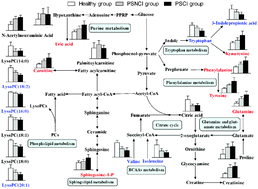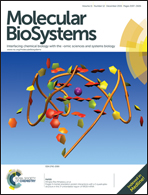Potential of serum metabolites for diagnosing post-stroke cognitive impairment†
Abstract
Cognitive impairment commonly accompanies clinical syndromes associated with stroke. The identification of laboratory markers of post-stroke cognitive impairment (PSCI) may help detect patients at increased risk of cognitive deterioration and determine the appropriate treatment regimes. A non-targeted metabolomics approach based on ultra-high performance liquid chromatography coupled with Q-TOF mass spectrometry was applied to study PSCI. The stroke patients were significantly distinguishable from the healthy subjects. Stroke patients could be well-stratified based on cognitive impairment. Several differential serum metabolites were further identified for post-stroke non-cognitive impairment (PSNCI) and PSCI patients, suggesting metabolic dysfunction in inflammation, neurotoxicity, bioenergetic homeostasis, oxidative stress, and apoptosis. In total, three serum metabolites (glutamine, kynurenine, and LysoPC(18:2)) were identified as candidate diagnostic biomarkers for PSCI, and their combined use yielded good diagnostic capacity for PSCI by receiver operating characteristic curves. The present metabolomics study provided a novel strategy for stratifying stroke patients with cognitive impairment using serum-based metabolite markers, which could be of great importance in understanding the pathological mechanisms and determining the appropriate treatment regimes of PSCI patients.


 Please wait while we load your content...
Please wait while we load your content...